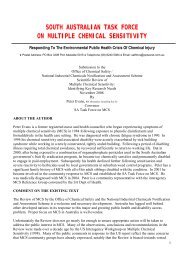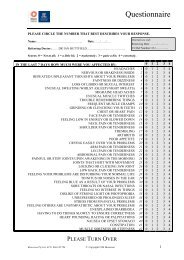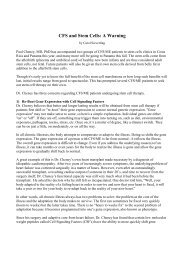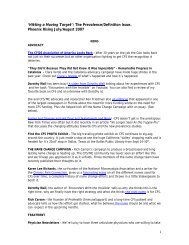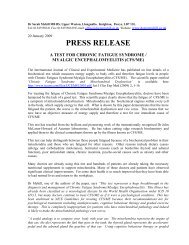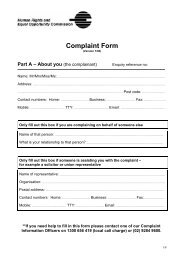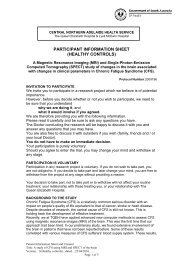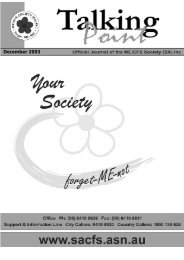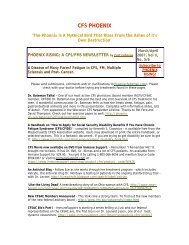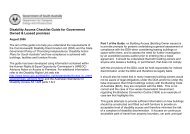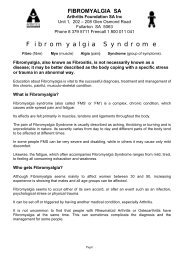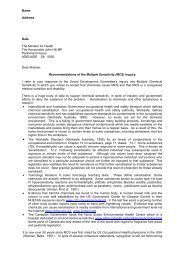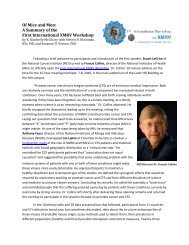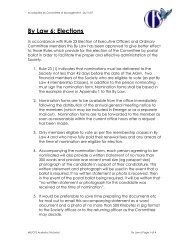1813 01 REUMA3 Editoriale - ME/CFS Australia
1813 01 REUMA3 Editoriale - ME/CFS Australia
1813 01 REUMA3 Editoriale - ME/CFS Australia
You also want an ePaper? Increase the reach of your titles
YUMPU automatically turns print PDFs into web optimized ePapers that Google loves.
Non pharmacological treatments in fibromyalgia 65tic and healing techniques that are not recognizedby the scientific community due to lack of pathophysiologicalevidence and mechanisms of actionthat are able to support their supposed efficacy. Allof the treatments cited below are popular with patientsand available (with payment) on several siteson the web; our search terms simply matched thetreatment type with “fibromyalgia”.Five of these are considered complementary or alternativetreatments that are more or less openlyused in FM:a) complete theoretical systems such as homeopathy,naturopathy and anthroposophy, traditionalChinese medicine, and ayurvedic medicine;b) body-mind techniques;c) nutriceutics;d) physical manipulation;e) energetic medicine encompassing pranotherapy,reiki, and healing touch.On a recent American survey (62) the most popularalternative treatments included physical exercise(48%), prayer (45%), massage (44%), and chiropractics(37%). Along with these treatments 83%of these patients use at least one vitamin and 52%use some sort of food supplementation.Complete therapeutic systemsAmong complete therapeutic systems, homeopathyis used the most. Its efficacy in FM, as for almostof its clinical application, has never been demonstratedin clinically controlled trials (63).Ayurvedic, anthroposophy and traditional Chinesemedicine as well as homeopathy are based on principlesthat are alien to Western biology and too farfrom the writer’s competence to be reasonably andfully reported here.Body-mind techniquesThis definition encompasses those techniques thatare used to improve mental control over bodilyfunctions.Some of them have been accepted already and usedin the context of traditional Western medicine suchas behavioural and cognitive therapies, supportgroups, and music therapy in its broader meaning,while others are still outside official medicine suchas meditation, therapeutic prayer, and mentallydrivenhealing techniques.Although not considered in this review, it is worthnoting the interesting results obtained by thesebody-mind techniques: they seem to be able to diminishthe number and the pain intensity of tenderpoints, and they can improve depression, anxietyand physical performance for over two years (64).Apparently, similar results have been obtained withmeditation techniques (65).Some clinical benefits have been obtained in a therapy-resistantgroup of FM patients by means ofhypnosis (66).Nutriceutics and dietary supplementationAs many as 52% of FM patients use some form ofalimentary supplementation including vitamins C(35%), E (31%), and B complex (25%) and Magnesium(29%).Green tea (24%) is popular as an antioxidant;weight control programs (20%) are also popular.Some alimentary supplements have demonstratedsome utility in reducing pain intensity and fatiguesuch as methionin (67-69) and magnesium (70, 71),while others did not show any improvement (72).Moreover, there are various other nutraceutics thatclaim some success in controlling FM-relatedsymptoms such as sleep disturbance and early sensationof fatigue.Unfortunately, as for almost all of the treatments reportedin this section, controlled studies are lacking.Some benefits have been claimed using melatonin(73), hypericum perforatum (St. John’s wort) anddietary control (74).Physical manipulationChiropratics and other forms of manipulationbased on mobilization or even manipulation ofbody segments like manual medical techniques(Meigne) and all forms of non medical massage. Itseems that the chiropractic approach is useful in thetreatment of FM.One study compared FM patients who experienced4 weeks of treatment to patients on a wait list andregistered a temporary decrease in cervical andlumbar pain in the treated group. These patientswere also taking medication (75).CONCLUSIONSFM patients frequently use alternative therapies,strongly indicating their dissatisfaction with traditionalmedical therapies as well as the substantialineffectiveness of these traditional therapies, especiallypharmacological treatment.At present, pharmacological treatments for FMShave a rather discouraging ratio poor symptom con-



